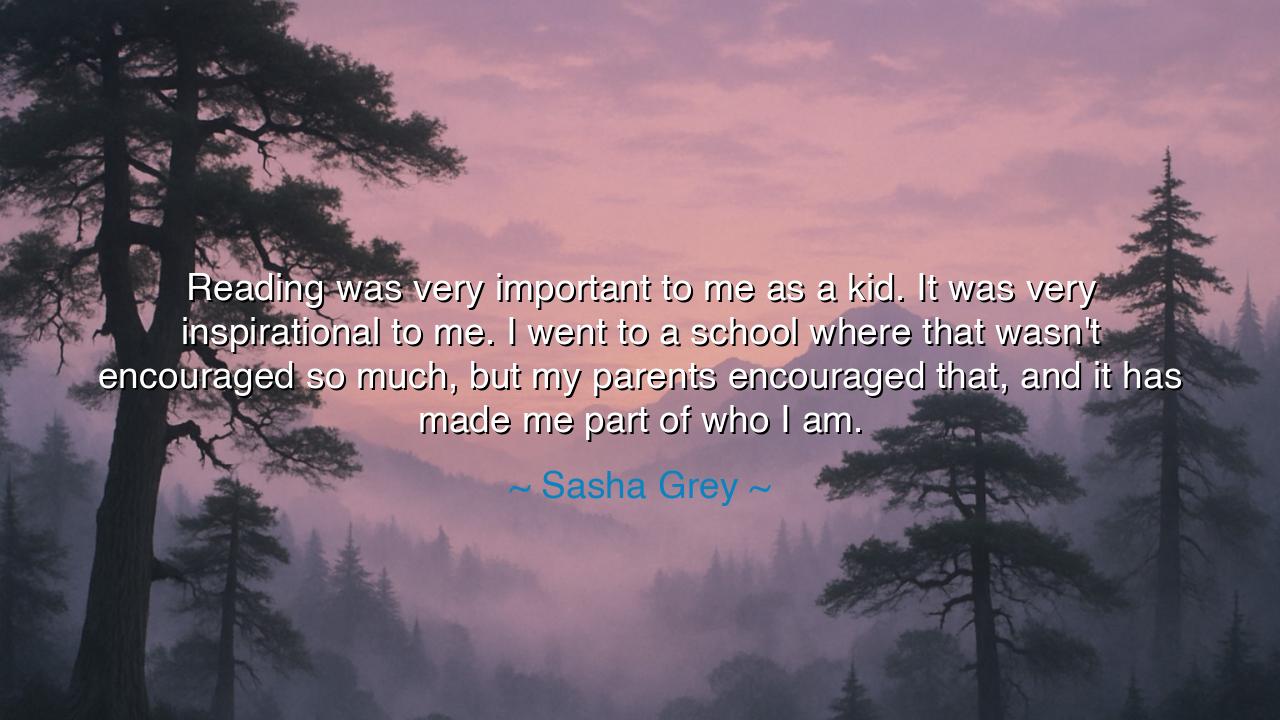
Reading was very important to me as a kid. It was very
Reading was very important to me as a kid. It was very inspirational to me. I went to a school where that wasn't encouraged so much, but my parents encouraged that, and it has made me part of who I am.






In the words of Sasha Grey, we hear a truth that stretches far beyond her own life, into the heart of every soul that has ever been changed by a story: “Reading was very important to me as a kid. It was very inspirational to me. I went to a school where that wasn’t encouraged so much, but my parents encouraged that, and it has made me part of who I am.” Though spoken simply, these words contain the essence of transformation — how the quiet act of reading, of communion with the written word, can awaken greatness in a world that often forgets to value the imagination.
When Grey speaks of reading as “very important,” she does not mean it merely as pastime or study, but as a lifeline — a form of escape and empowerment. To a child surrounded by limitation or misunderstanding, books become portals, voices from beyond the horizon whispering: There is more than this. The inspirational power of reading lies not only in the stories themselves, but in the realization that worlds can be built within the mind. In every page, the young reader finds evidence that thought is infinite, that one need not remain bound by circumstance. And so, in her youth, Sasha Grey discovered through reading the same truth that countless dreamers before her have known — that knowledge, imagination, and empathy are born in the stillness of turning pages.
Her words carry an undertone of quiet rebellion. She tells of attending a school where reading was not encouraged, where curiosity was perhaps met with indifference or constraint. Yet even amid such barrenness, her parents sowed the seeds of wonder. This contrast between neglect and nurture reflects one of the oldest patterns in human history: the few who ignite the flame of learning must often do so against the wind. So it was with Galileo, whose questions defied the silence of his age, and with Frederick Douglass, who, forbidden to read, taught himself by stealing glimpses of forbidden books — until those words freed not only his mind, but his destiny. Like them, Grey’s experience affirms a universal lesson: that true education begins not in institutions, but in the hunger of the soul.
Reading is more than literacy; it is the shaping of identity. When Grey says it “made me part of who I am,” she acknowledges the sacred power of the written word to mold the inner world. Every story we read becomes part of our own, weaving itself into the tapestry of memory and thought. The ancients understood this well. Socrates, though wary of writing, still spoke of the “midwifery of the soul” — the process by which thought gives birth to truth. Books perform that same midwifery for the reader; they awaken within us the questions that define our humanity. Through books, we inherit the wisdom of those who have come before and find within ourselves the courage to imagine what might yet be.
In the quiet encouragement of her parents, we also find the timeless role of the elder — the guardian who passes down the light of knowledge when institutions fail. For it has always been the home, the hearth, where the first lessons of greatness are learned. The story of Alexander the Great tells us that though he conquered the world, he revered Aristotle more than his own father, for his father gave him life, but Aristotle gave him purpose. So too does Grey honor those who kindled her passion for reading — for by doing so, they gave her the foundation of selfhood, the tools to see beyond what was taught and to dream beyond what was allowed.
Her words, though personal, are a call to all generations. In an age where screens replace pages and silence is drowned by endless noise, the discipline of reading — of slowing down, of listening inward — is a revolutionary act. Reading teaches patience, imagination, and empathy — virtues that are rare and radiant in a hurried world. To read is to travel without moving, to live a thousand lives without leaving one’s own, and to gather wisdom that no one can ever take away.
So, dear listener, take this lesson to heart: read, not only for knowledge, but for transformation. Read when the world seems dark, for the words of the wise are lamps that never dim. Read when you feel misunderstood, for in the pages of others’ stories you may find your own reflection. And if you are a parent, a teacher, or a guide, do as Sasha Grey’s parents did — encourage curiosity, even when others do not. For in every child who opens a book, there lies the seed of greatness, the promise of renewal. And one day, that child, too, may look back and say, “It made me part of who I am.”






AAdministratorAdministrator
Welcome, honored guests. Please leave a comment, we will respond soon